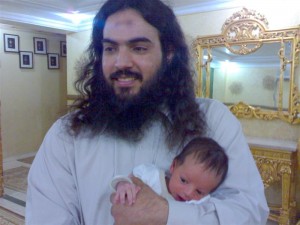When we left Harbi, he had met a Algerian Jihadi who told him how to get to Iraq.
According to Furqan al-Junubi’s account, Harbi and two other Kuwaitis–Abu Salih (`Abd Allah Salih al-`Ajami), and Abu Talha (Nasir) al-Dawsari–pledged to go to Iraq and die there. They called this “The Pledge of the Houris” (the virgins promised to those allowed to enter Paradise–martyrs are a shoe in). Al-Miskin al-Muhajir was with them, but he could not go due to personal circumstances (he was able to go to Afghanistan latter–see part 1).
I haven’t been able to find much on Dawsari, but there’s plenty on `Ajami. He was actually being held in Guantanamo until the U.S. transferred him to Kuwaiti custody in 2005; the Kuwaits acquitted him of all charges. By the time `Ajami met Harbi, he was married, had one child, and was financially comfortable. Those who knew him thought he had been rehabilitated.
After several days, the three men departed for Iraq. Junubi relates that Harbi left behind a large house, eight children (now ten), and a substantial sum of money. (Harbi was a car salesman. From the looks of this, he also seems to have been a racing enthusiast. You can see Harbi at the 0:38 mark.)
Before Harbi left, Junubi, the author of our account, wrote and wished him well. Harbi replied that they would soon meet in Paradise. Harbi’s response was dated April 5, 2008, which is probably after he had left Kuwait (one of his traveling companions, `Ajami, died in late March).
Junubi relates that the three men wen to Iraq through a coordinator, but he doesn’t say where their transit point was. It has now come to light that the men went through Syria. Indeed, one of the last photos of Harbi was taken by himself on the flight to Syria.
According to press reports, `Ajami called his family from Syria to tell them where he was headed and why. The next time they would hear news of him was when they received an anonymous call informing them that `Ajami had carried out a suicide bombing. Harbi’s family got the same call a few weeks later.
According to a Furqan video that was posted on June 21, `Ajami carried out a March 23 suicide attack on the Harmat neighborhood of Mosul. A little over a month later, Harbi carried out an April 26 attack on the Tel al-Rumman police station in Mosul. (Bill Roggio at Long War Journal has a good summary of the contents, based partially on Nibras Kazimi’s analysis).
The video is over 30 minutes long and tedious in parts, but many of the useful bits can be viewed here. Harbi is the bearded, long-haired man in the center of everything (his coiffure and beard seem to be deliberately modeled on that of Khattab, a Jihadi commander in Chechnya that Harbi emulated, according to Junubi).
The first clip you see is that of Harbi talking about jihad and then chanting a nashid (hymn) with his brethren (notice the childrens’ voices in the background). The next clip is Harbi standing next to the vehicle he will use to blow himself up. After that is his attack on Tel al-Rumman, followed by `Ajami’s attack on the Harmat neighborhood. Last is Harbi again leading a group chanting a hymn.
In the full video, Harbi gives his final testament (wasiyya), summarized here. In it, he criticizes a hardline Kuwaiti Salafi scholar, Hamid al-`Ali, for badmouthing the Islamic State of Iraq. He then explains to his family that he decided to leave for Iraq because the Companions of Muhammad did not choose to sit with their families when fighting was called for. (Harbi may have been feeling a little guilty–Junubi tells us that his mother was very ill when he left.) Harbi then chastizes other Jihadis for sitting behind their computers and doing nothing.
At the end of his testament, Harbi stands next to his car bomb. As he pats the explosive tank, he says:
I have everything: a house, a car, two wives, and eight children. But now I find happiness in my heart that I did not find in any other place.
There’s a lot to talk about here and it probably deserves a separate post, but just few closing thoughts to end the series:
- A mixture of indignation, glory seeking, camaraderie, and promise of eternal reward motivated Harbi and `Ajami to pledge themselves to die in Iraq. Since both had been detained and likely treated harshly, they may have been motivated by a desire for personal revenge as well.
- Syria is the transit point for our group, as it is for many other Gulfis seeking martyrdom in Iraq. But note that it is an Algerian Jihadi, not a local Kuwaiti, that informs the Kuwaiti group of the route.
- After reading Junubi’s account, one Ekhlaas member asked 1) why Harbi went to Iraq rather than Afghanistan and 2) why he chose to be a martyrdom operative when he had enough experience to be a trainer. In other words, why didn’t a skilled Jihadi like Harbi put his talents to better use. Junubi answers that Harbi went to Iraq because it is much easier to travel there than to Afghanistan. Moreover, many go to Iraq because it is close by. On the second question, Junubi discloses that Harbi had thought about becoming a coordinator but decided he wanted to die a martyr and not fight (presumably since the latter did not guarantee martyrdom).
Document (Arabic): 6-26-08-ekhlaas-furqan-al-junubi-story-of-harbi-and-bawasil







